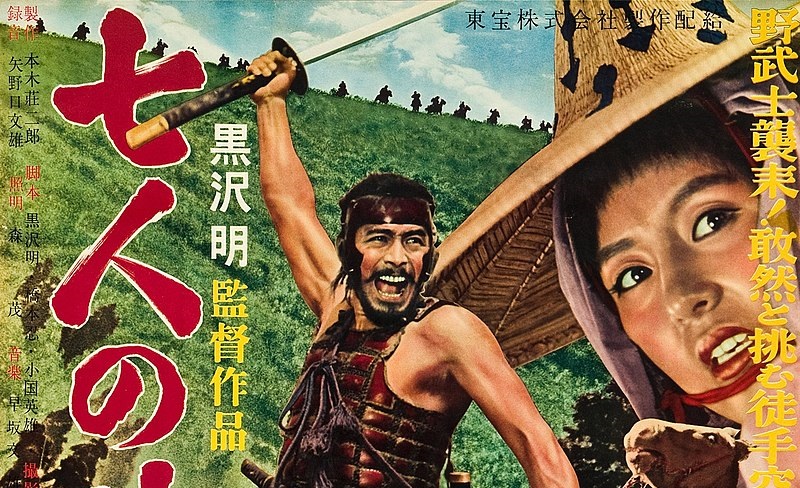- Opinion
- 14 de November de 2024
- No Comment
- 9 minutes read
The pedagogy of «The Seven Samurai»

The pedagogy of «The Seven Samurai»
The problem, precisely, is that to insist on preventing them from evolving, from maturing


-Children are sometimes better than adults
-Yes, when they are treated like adults
This brief dialogue from the unforgettable film “The Seven Samurai” (Akira Kurosava, 1957) evokes an old idea according to which childhood and adolescence are stages whose purpose is preparation for adult life. In short, it is not enough to have a morphologically and biologically adult body to become an adult, but to have gone through a process that consists of preparing to become such one. A goal that it may not always be easy to reach. A journey in which certain things must be learned and certain others must be passed through. Inevitably.
All human societies have had their respective initiation and transition rituals, which symbolically mark the passage to the social consideration of an adult. A condition that supposes being in a position of sufficient moral judgment and autonomy to live, orient oneself and interact socially, intellectually and emotionally. Intellectually, in terms of acquiring knowledge and skills to earn a living professionally and freely decide what one wants to do with his own life; emotionally, to equip ourselves psychologically to assume our own identity and circumstances in social interaction and, ultimately, in life. In other words, things are not always as we would like them to be, and facing frustration is also a training learning process. As Hannah Arendt stated, the function of education is to teach how the world is, not the art of living in it. The latter will be decided by each person according to his own criteria and free will, always based on the Ortegan “circumstances” inextricably linked to anyone.
In this sense, the first paradox of postmodern pedagogy, not to call it an oxymoron, is that the more theorizing there is involved, the more everything seems to be geared towards preserving an ideal childlike state, a kind of bonsai school, isolating children and adolescents in a sort of protective bubble that keeps them safe from any interference from adult life – or, in other words, from the real world – for which, on the other hand, we are supposed to be preparing them. As if becoming an adult were the result of an exclusively biological process. We strive so that they do not have to make any effort, we strive so that they do not experience any kind of frustration… But none of this will prevent them from a society that will later demand them effort, nor will avoid their expectations to be frustrated on many occasions, situations that they will only be able to overcome with the fortitude acquired from previous experiences, which, if they have not had any, puts them in a position of clear defenselessness. Nobody says that kids should not be protected, but they should also be prepared for what they will encounter; they won’t be ever children so long, under the adult guardianship of parents, teachers, judges… In other words, they will not always be minors.
In the background of all this is underlying Rousseau‘s famous idea, according to which man is good by nature and so is born, but society perverts him. According to this, there is a tendency to see the process of becoming an adult as the loss of natural innocence. And there is also a tendency to see these stages of transition from a “fixist” point of view, wich is a not at all evolutionary perspective, nor dialectics, let’s say. From this perspective, traditional education and school would be nothing but a mannered pretense that represses the impulses of the individual and alienates him from his own nature. If, on the other hand, if we allow natural instinct to flourish, then goodness, spontaneity and creativity innate will spread all around. In other words: it is forbidden to prohibit.
But if we admit that human society is what it is, whether we like it or not, then we have to admit that we are not preparing the new generations to face the scenario that, however undesirable and imperfect it may be, they will find themselves in when they reach adulthood. So, of course, what is needed is to change society, and to achieve this, we must first change the individual; that is, the way in which we educate kids. Only in this way will we might succeed on our aim change society. It is certainly a kind of an atrabilious and no sense “Peterpanism”, yes, but this is what there is and this is the principle that underlies so much novolatrous pedagogy and so much imposition of method over content.
But then, and that’s the second paradox, if the new education consists of favouring the spontaneous and “natural” manifestations of the individual, we are forgetting that perhaps the “natural” human condition is not as we had imagined it, and neither, of course, is the new society dreamed of. But since what seems to be important is the moral height of the purposes, neither the facts nor the results seem to matter too much. In other words, let us not allow reality to spoil a beautiful theory.
It is fine and reasonable for a child to behave like a child, or for an adolescent like an adolescent. But if we forget that these are also stages of transition towards adult life, then we can only conclude that we are dealing with a crude mystification, an unreality. And that this pedagogy suffers exactly the same as the burlesque and lucid joke that was made about the Francoist “OJE” and the grotesque fascist elements with which it was adorned. The question was “What is a century of the OJE?” and the answer: “Ninety-nine children dressed as adults, and one adult dressed as assholes”. They were all dressed the same: a blue shirt, red shorts with socks and a beret… Mutatis mutandis, in our case, children prevented from maturing because of children minded adults.
Everyone will agree that an airplane pilot must be prepared to know how to withstand stressful situations; or a doctor when he is operating. But the preparation to withstand them is acquired through a learning process in which intellectual aspects – knowledge and skills – and emotional aspects – knowing how to manage a situation – are involved and interrelated. And it does not seem that the current trends towards the primacy of emotional education go in this direction either. Because as long as emotional education it’s not done from reason and logic, then it simply consists of following instinctive impulses and volitions. And children already know how to do that. What is needed is precisely that they learn to control themselves and prepare them for adult life. If we only prepare children to be children, there is no need for saddlebags for this journey. Unless, of course, behind this exaltation of emotions there is an attempt to exploit them. Which, by the way, returning to the previous joke, is what was done with the fascist and falangist youth.
However, fortunately, and contrary to what this pedagogy may think, it is true that very often, as Kurosava reminded us in the cinematic masterpiece cited above, when children are treated like adults, teaching them to be so even though being aware they are not yet, precisely because it is what they are learning to be, they tend to be much better than many adults; above all, better than adults who insist on treating them like children. The problem, precisely, is that to insist on preventing them from evolving, from maturing.
Source: educational EVIDENCE
Rights: Creative Commons

